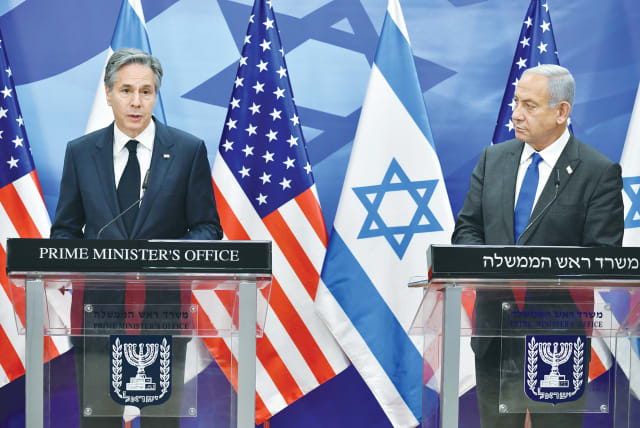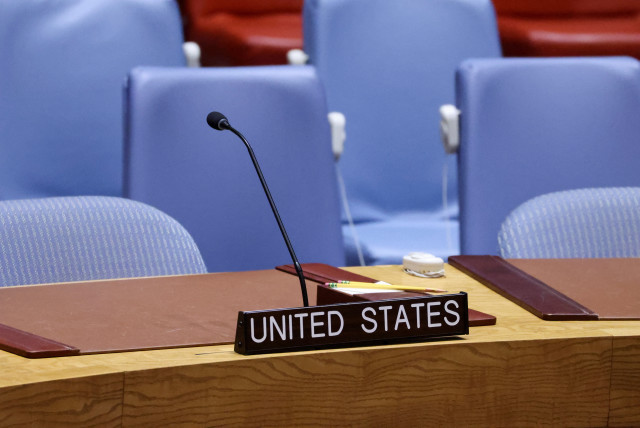The UN ceasefire resolution marks a low point in US-Israel relations - opinion

Israel and the US should have, together, embraced the second part of the Security Council’s resolution and demanded the immediate release of the hostages as a prerequisite for the ceasefire.
It would have been hard to avoid noticing the satisfied smiles of UN Security Council representatives when the United States decided not to exercise its veto earlier this week. Although the resolution in question was non-binding, it not only demanded an immediate ceasefire from Israel but also the urgent release of the hostages.
Both Israeli and international media outlets made a big deal out of the first few lines of the ceasefire demand while choosing to play down the more significant part of the resolution, which was the immediate and unconditional release of the hostages.
With US-Israel relations at a low point, the Jewish state’s decision not to send its delegation to Washington for talks about the hostage situation and the IDF’s entry into Rafah has in no way contributed toward the amelioration of relations with America’s most sympathetic president. Yet we are duty bound to remember that just after October 7, US President Joe Biden, with his famous “Don’t!” prevented the war from escalating on additional fronts and dispatched the United States Navy to the region.
Israel and the US should have, together, embraced the second part of the Security Council’s resolution and demanded the immediate release of the hostages as a prerequisite for the ceasefire.
The US decision not to exercise its veto was a clear sign of the deteriorating relations between the two countries. It is incumbent upon Israel to avoid any further degradation of that relationship, by continuing talks and negotiations.
What is puzzling is the Israeli media’s delight in the mistranslation – from English to Hebrew – of the statement by Republican presidential candidate and former and perhaps future president Donald Trump, calling for an end to the war, for Israel to “finish up” with Hamas and to bring back the hostages. The Hebrew headline was of course “Trump also supports ending the war,” insinuating that he was going against Israel’s wishes.
This is similar to how the second part of the UN resolution – the return of the hostages – was basically pushed off the page by news of the demand for a ceasefire.
The die was cast on October 7
THE DIE was cast on October 7, the day the Hamas monsters carried out a pogrom against Israel. This did not lead to yet another “operation” but to an actual war against the Hamas Nazi tyrants, aimed at dismantling their capabilities and destroying their every last battalion and missile.
Years of wrong moves and erroneous thinking and the unfounded opinion that Yahya Sinwar and Hamas had been deterred, vanished into thin air. Much has been and will be written about how the “best army in the world” was caught napping and why its elite Unit 8200 was lulled into a false status quo, leading to Israel’s worst intelligence failure and military disaster since the establishment of the state.
Why and by whom was it decided that Hatsav, the unit dedicated to monitoring and analyzing enemy communications, was no longer relevant? Why did the present and previous governments allow Hamas’s insane military buildup in the South and Hezbollah’s in the North? The answers to these tough questions will undoubtedly be provided by members of the committee that should already have been formed to investigate the negligence.
Despite all of this, we must not underestimate, even for a moment, the strength of the IDF operating in the Gaza Strip and the phenomenal results it is achieving.
Of course, there are also those self-appointed experts among us who transmit weakness and make delusional claims about how we will not succeed in achieving our goal and will become bogged down in the mud of Gaza – as we once were in Lebanon.
I want to believe that our leaders have learned the lessons of Lebanon and that we will continue in Gaza for a period of time until an appropriate entity can take over responsibility for the Strip. To rebuild it, we must insist on the establishment of an international body in cooperation with Egypt, the United Arab Emirates, Palestinian technocrats, and other countries – with Israel reserving the right to make necessary military incursions and ensure that nothing resembling Hamas is ever established there again.
We should also not be moved by statements from Hamas in Judea and Samaria to the effect that they are breaking away from Hamas in Gaza and are about to establish a new, mainly technocratic entity to assume responsibility for Gaza – whose path will be different and whose role will be to bring about “unification.”
It will be the same mutton dressed as lamb and it will again, try to lull us and the world into a stupor.
After all, we have not heard a single statement from the head of the Palestinian Authority (PA) Mahmoud Abbas, or from his friends, about our right to this land, nor any condemnation of the criminal acts carried out against us, and still being visited upon our hostages.
On the contrary, while daily attacks are carried out against Israelis by terrorists from the Palestinian cities in Judea and Samaria, Abbas and the members of his flock remain silent.
The author is CEO of Radios 100fm, honorary consul, vice dean of the consular staff, and vice president of the Ambassadors Club in Israel.
Jerusalem Post Store
`; document.getElementById("linkPremium").innerHTML = cont; var divWithLink = document.getElementById("premium-link"); if (divWithLink !== null && divWithLink !== 'undefined') { divWithLink.style.border = "solid 1px #cb0f3e"; divWithLink.style.textAlign = "center"; divWithLink.style.marginBottom = "15px"; divWithLink.style.marginTop = "15px"; divWithLink.style.width = "100%"; divWithLink.style.backgroundColor = "#122952"; divWithLink.style.color = "#ffffff"; divWithLink.style.lineHeight = "1.5"; } } (function (v, i) { });

